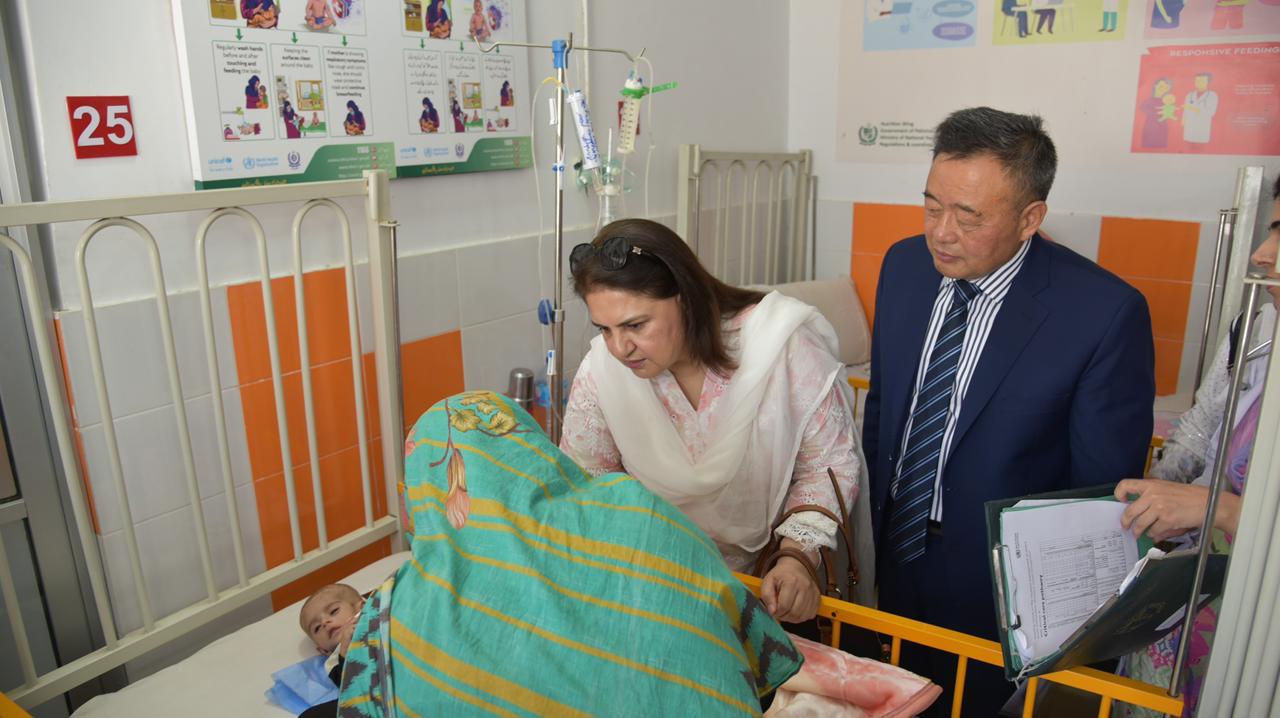
Islamabad, 3 June 2025: In a powerful show of commitment to combating child malnutrition in Pakistan, the World Health Organization (WHO) and the Benazir Income Support Programme (BISP) have pledged to expand their lifesaving partnership that already treats 43,000 children annually suffering from severe acute malnutrition with medical complications.
During a high-level visit to the nutrition stabilization centre at the Federal Government Polyclinic in Islamabad, BISP Chairperson Senator Rubina Khalid and WHO Representative in Pakistan Dr Dapeng Luo reaffirmed their shared vision to extend support to even more vulnerable families across the country.
“I am truly thankful to the World Health Organization for this valuable partnership,” said Senator Khalid. “With WHO’s support, we aim to reach even more families. Stunting is not just a matter of physical growth—it affects a child’s mental development too. This is not just an option—it is our responsibility.”
Also Read: Militants Attack Police Stations in Bajaur and Bannu; SHO Among Several Injuredt
The initiative operates under the umbrella of the Benazir Nashonuma programme, launched to tackle widespread stunting and malnutrition. Since 2022, over 46,000 children under two have received critical inpatient care at 169 WHO-supported nutrition stabilization centres (NSCs) funded by BISP, while over 64,000 mothers and caregivers have received targeted counselling on nutrition and child care practices.
The next phase of the collaboration aims to reach even more children. In 2025, WHO will support 199 centres nationwide, including 169 funded by BISP, with the goal of treating close to 80,000 children under five and counselling 120,000 mothers and caregivers.
A standout figure from the program is the 98% cure rate among children treated—well above the international standard of 75%—marking the program as a global model of success.
“A 98% cure rate is an excellent result and reflects the hard work of our teams. But even one child lost to malnutrition is one too many,” said Dr Dapeng Luo. “Each child is a life with potential, and WHO remains committed to scaling up our collaboration with BISP to reach every child in need, particularly as climate change intensifies the threat of acute malnutrition.”
The program’s impact is rooted in collaboration. WHO works closely with national and provincial health authorities, along with agencies like UNICEF and the World Food Programme (WFP), to ensure a seamless referral and care network. WFP leads efforts in community-based prevention and detection, referring severe cases to WHO or outpatient cases to UNICEF.
WHO’s contributions include technical expertise, operational support, infrastructure upgrades, therapeutic supplies, training of staff, and counselling based on global best practices.
Despite these efforts, the scale of the challenge remains daunting. Pakistan is one of ten countries where more than half of children under five suffer from stunting or wasting. The current stunting rate stands at 40%—equating to 10 million children—while 17.7% (5 million) suffer from wasting. The cost of inaction is immense: an estimated $17 billion economic loss annually, or 6.4% of Pakistan’s Gross National Income, largely due to reduced human productivity and increased healthcare costs.
As climate change continues to worsen malnutrition trends, the WHO-BISP partnership represents a critical step toward safeguarding the health and future of Pakistan’s youngest citizens—one child at a time.